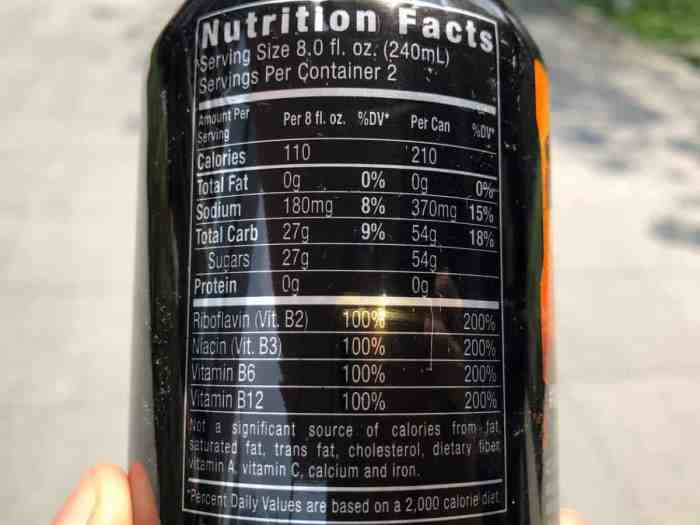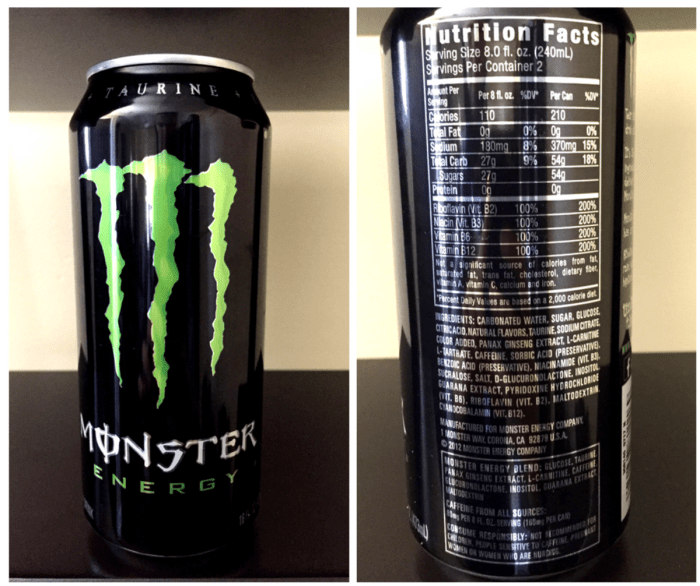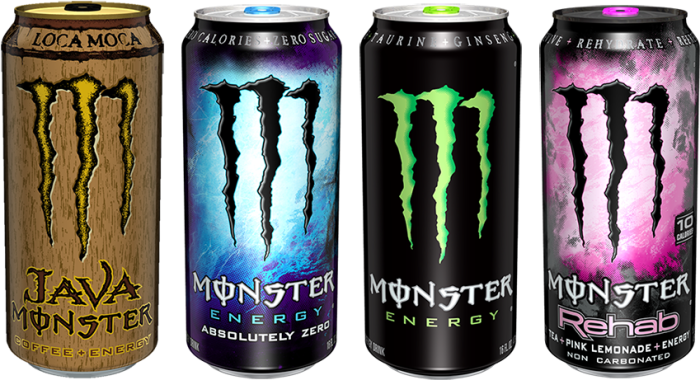Monster Energy Drink Ingredients

Monster drink nutrition facts – Monster Energy drinks contain a complex blend of ingredients contributing to their characteristic taste and purported energy-boosting effects. Understanding these ingredients is crucial for consumers making informed choices about their beverage consumption. This section details the components of a typical Monster Energy drink, categorizes them by function, and briefly compares them to a similar energy drink.
Ingredient Composition of Monster Energy Drink
The precise ingredient list can vary slightly depending on the specific Monster Energy flavor, but a typical can contains ingredients from several categories. The following table provides a breakdown:
| Category | Ingredient (Common Name) | Ingredient (Chemical Name, if applicable) | Function |
|---|---|---|---|
| Sweeteners | Sugar | Sucrose | Provides sweetness and calories. |
| Sweeteners | High Fructose Corn Syrup | Provides sweetness and calories; cheaper alternative to sugar. | |
| Stimulants | Caffeine | 1,3,7-Trimethylxanthine | Stimulates the central nervous system, increasing alertness and energy. |
| Stimulants | Guarana Extract | Natural source of caffeine and other stimulants. | |
| Vitamins & Minerals | Vitamin B12 (Cobalamin) | Contributes to energy metabolism. | |
| Vitamins & Minerals | Vitamin B6 (Pyridoxine) | Contributes to energy metabolism. | |
| Acids | Citric Acid | Provides tartness and acts as a preservative. | |
| Preservatives | Sodium Benzoate | Inhibits microbial growth. | |
| Flavorings | Natural and Artificial Flavors | Contributes to the overall taste profile. | |
| Other | Carbonated Water | H₂O (with dissolved carbon dioxide) | Provides the fizzy texture. |
| Other | Taurine | 2-Aminoethanesulfonic acid | Amino acid with various purported benefits, though its role in energy drinks is debated. |
| Other | Panax Ginseng Extract | Herb with purported adaptogenic properties. |
Ingredient Function Categories, Monster drink nutrition facts
The ingredients in Monster Energy drinks can be broadly categorized into functional groups: Sweeteners provide the sugary taste and calories; stimulants, primarily caffeine and guarana extract, provide the energy boost; vitamins and minerals are added for nutritional value, although the amounts are generally small; acids contribute to the taste and act as preservatives; and flavorings create the specific flavor profile of the drink.
Comparison to a Similar Energy Drink (Red Bull)
Red Bull, a leading competitor, also contains caffeine, sugar, and various vitamins and minerals. However, key differences exist. Red Bull typically uses sucrose (sugar) as its primary sweetener, while Monster often includes high fructose corn syrup. Red Bull’s ingredient list often features different flavorings and may include additional ingredients like glucuronolactone, which is absent or present in lesser amounts in some Monster varieties.
The precise caffeine content also varies between brands and even specific flavors within each brand. A direct comparison requires examining the specific nutritional information panels of individual products.
Health Concerns and Potential Risks

Monster Energy drinks, while popular for their stimulating effects, contain high levels of caffeine, sugar, and other ingredients that can pose potential health risks with regular consumption. Understanding these risks is crucial for making informed choices about beverage intake. This section details potential negative impacts on cardiovascular health, sleep patterns, and dental health, along with recommended caffeine limits.
The high concentration of stimulants and sugars in Monster Energy drinks can have several adverse effects on the body. While occasional consumption may not cause significant issues, regular or excessive intake warrants consideration of the potential health consequences.
Cardiovascular Health Impacts
Regular consumption of Monster Energy drinks can negatively impact cardiovascular health. The high caffeine content can increase heart rate and blood pressure, potentially leading to palpitations and arrhythmias, especially in individuals sensitive to caffeine or those with pre-existing heart conditions. The high sugar content contributes to weight gain, a known risk factor for heart disease. Furthermore, some studies suggest a correlation between energy drink consumption and increased risk of cardiovascular events, although more research is needed to establish a definitive causal link.
Monster energy drinks are notorious for their high sugar and caffeine content, impacting overall nutrition. However, a balanced diet can help mitigate these effects; for instance, consider the nutritional benefits of incorporating more vegetables, like the surprisingly nutritious grape tomatoes nutrition facts show. Understanding the nutritional profile of both Monster and healthier alternatives allows for informed choices regarding your overall health and well-being.
For example, a study published in the journal “Heart Rhythm” showed a correlation between energy drink consumption and increased risk of cardiac arrhythmias in young adults.
Sleep Disturbances
The significant caffeine content in Monster Energy drinks is a potent stimulant that can interfere with sleep patterns. Consuming these drinks later in the day can lead to difficulty falling asleep, reduced sleep quality, and daytime sleepiness. This disruption of the sleep-wake cycle can have detrimental effects on cognitive function, mood, and overall health. For instance, consuming a Monster Energy drink several hours before bedtime could result in difficulty falling asleep and lead to a shorter duration of restorative sleep.
Dental Health Concerns
The high sugar content in Monster Energy drinks contributes significantly to dental problems. The sugar feeds bacteria in the mouth, leading to the production of acids that erode tooth enamel, increasing the risk of cavities and gum disease. The acidic nature of the drink itself further exacerbates this erosion. Regular consumption without proper oral hygiene practices can lead to serious dental issues requiring professional intervention.
For example, consistently consuming Monster Energy drinks without adequate brushing and flossing could result in significant enamel erosion and the development of cavities.
- Increased heart rate and blood pressure
- Potential for palpitations and arrhythmias
- Contribution to weight gain and increased risk of heart disease
- Disruption of sleep patterns and reduced sleep quality
- Increased risk of cavities and gum disease due to high sugar content
- Tooth enamel erosion due to acidity
Recommended Daily Caffeine Intake
The recommended daily caffeine intake varies depending on individual factors such as age, weight, and overall health. However, general guidelines suggest limiting caffeine intake to no more than 400 milligrams per day for healthy adults. A single can of Monster Energy drink typically contains around 160 milligrams of caffeine, meaning two cans would already exceed the recommended limit for many individuals.
Exceeding the recommended daily caffeine intake can lead to a range of adverse effects, including anxiety, insomnia, and digestive problems. It’s crucial to monitor caffeine consumption from all sources, including coffee, tea, and other energy drinks, to stay within safe limits.
Alternatives and Healthier Choices: Monster Drink Nutrition Facts

Choosing healthier alternatives to Monster Energy Drink is crucial for maintaining overall well-being. While Monster provides a quick energy boost, its high sugar and caffeine content can negatively impact health in the long run. Fortunately, several options offer similar energy benefits with fewer drawbacks. These alternatives focus on providing sustained energy through natural means, minimizing the risk of energy crashes and negative health consequences.
Many healthier alternatives prioritize natural sources of energy and hydration, reducing reliance on excessive sugar and artificial stimulants. This approach promotes a more balanced energy level throughout the day, avoiding the sharp peaks and subsequent crashes often associated with energy drinks like Monster. Furthermore, these alternatives frequently incorporate vitamins and minerals, contributing to overall nutritional intake.
Healthier Energy Drink Alternatives
The following table compares Monster Energy Drink with three healthier alternatives: a fruit-infused water, green tea, and a naturally sweetened berry smoothie. These examples represent diverse options that cater to different preferences and dietary needs. Note that nutritional values can vary depending on specific brands and preparation methods.
| Nutrient | Monster Energy Drink (per can) | Fruit-Infused Water (per 16oz) | Green Tea (per 8oz cup) | Berry Smoothie (per 16oz) |
|---|---|---|---|---|
| Calories | ~210 | ~0-20 (depending on added fruit) | ~2-5 | ~150-250 (depending on ingredients) |
| Sugar (grams) | ~54 | ~0-10 (depending on added fruit) | ~0 | ~20-40 (depending on ingredients) |
| Caffeine (mg) | ~160 | ~0 | ~25-35 | ~0 |
| Vitamins & Minerals | Limited | Variable, depending on fruit | Contains antioxidants | Variable, depending on ingredients |
The table highlights the significant differences in sugar and caffeine content. Fruit-infused water provides hydration with minimal calories and sugar, while green tea offers a moderate caffeine boost with antioxidants. A berry smoothie provides a more substantial source of nutrients and energy from natural sugars and fruits. Each alternative offers a unique profile that caters to various needs and preferences, while minimizing the negative health effects associated with high sugar and caffeine intake.
Benefits of Healthier Alternatives
Switching to healthier alternatives provides numerous benefits. Reduced sugar intake minimizes the risk of weight gain, type 2 diabetes, and other metabolic disorders. Lower caffeine consumption reduces the likelihood of anxiety, insomnia, and heart palpitations. Furthermore, the increased consumption of fruits, vegetables, and other natural ingredients provides essential vitamins, minerals, and antioxidants that contribute to improved overall health and well-being.
Choosing these alternatives fosters a more balanced approach to energy consumption, promoting sustained energy levels and avoiding the energy crashes common with highly processed energy drinks.
FAQ Resource
What are the long-term effects of consuming Monster Energy regularly?
Long-term regular consumption may increase the risk of heart problems, sleep disturbances, anxiety, and dental issues due to high sugar and caffeine levels.
Is Monster Energy suitable for children or adolescents?
No, due to its high caffeine and sugar content, it’s not recommended for children or adolescents. Their developing bodies are particularly sensitive to these stimulants.
Are there sugar-free versions of Monster Energy?
Yes, some variations of Monster Energy are available with reduced or no sugar, often using artificial sweeteners. However, always check the specific nutritional information for the product.
How does the caffeine in Monster compare to coffee?
A single can of Monster typically contains significantly more caffeine than a cup of coffee, though the exact amount varies depending on the coffee type and brewing method.
Can I mix Monster with alcohol?
Mixing Monster with alcohol is generally discouraged due to the combined effects of caffeine and alcohol on the body, potentially leading to increased dehydration and impaired judgment.
